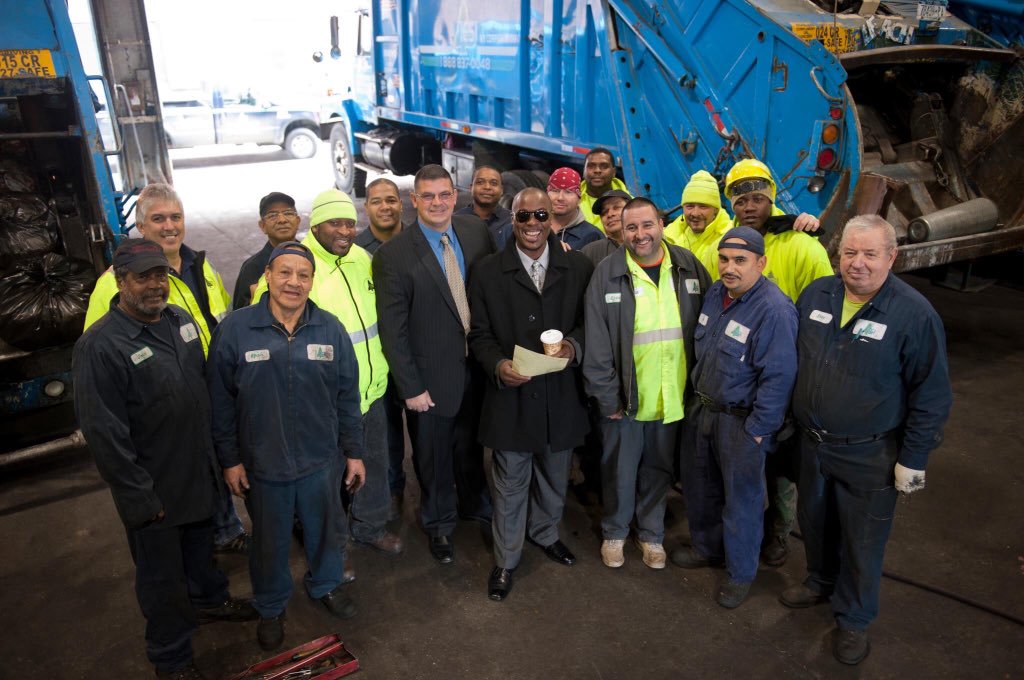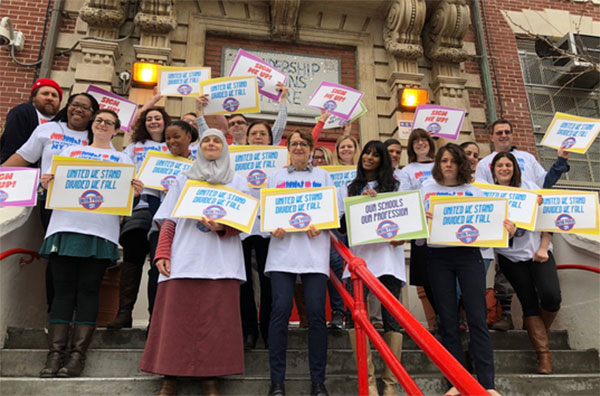An Essential Agreement on Carting Safety, and More to Come

(photo: @laborers108)
A quiet announcement recently by the Business Integrity Commission - the watchdog agency that regulates the city’s food and fish wholesale markets, commercial waste services, and shipboard gambling - is unlikely to be etched in the history books or remembered for decades to come.
But it marked a significant turning point in an unnecessarily contentious dialogue between city officials and the companies that daily manage 12,000 tons of waste, recyclables, and organics generated by the city’s businesses and institutions – as well as labor leaders, and environmental and transportation safety advocates.
The announcement – a new safety manual for the city’s trade waste sector – is the result of an unprecedented collaboration.
Traditionally, commercial waste is an industry that everyone loves to hate – its big, loud trucks; its late-night collections; and its odors make it an easy target for vilification. It’s easier to blame others for the garbage all of us generate and we wish to forget, and to take for granted what’s required every night, 365 days a year, to keep our city clean, productive, and ready for the next day.
This new manual pulls together best practices for every step of the process from putting a truck on the road through its safe return every morning with its driver and helper aboard, without damage to people or property with which it might interact while on the streets.
That’s no easy job. In fact, waste-related jobs are among the top five most dangerous in the nation.
The just-published manual arose from the creation of an advisory board to guide the city’s controversial intention to replace the open-market system that promotes efficiency, choice, competition, and innovation with a system of geographic zones and exclusive franchise rights.
While we strongly disagree with the zone-based initiative, the effort led by BIC Commissioner Brownell proved that other approaches are possible – with actual results sooner, better and cheaper than waiting five years or more for a system with city government-initiated contracts to be designed, adopted, and implemented. In that same period, multiple safety initiatives could be implemented – all trucks soon will have cleaner engines, most new trucks will have cameras and all with have sideguards, and more frequent safety training could be initiated, with active engagement with the industry’s leading unions.
All that is necessary is commitment, and good-faith efforts by all concerned. If nothing else, safety is a “safe space” for those who chose to be adversaries on other matters.
This joint effort provides two takeaways:
First, the commercial waste industry – nationally and locally – makes safety a high priority.
Local efforts include semi-annual industry-city symposiums focused on safety (the fourth is scheduled for April); installation of protective side-guards; and renewed commitments to employee training, proper management, and personal protective equipment.
Second, safety requires “continuous improvement,” it’s never “over.” To be successful, the effort must be maintained by all concerned.
We know that safety is not an event, achieved through a single action. To that end, the new safety manual isn’t the first safety-focused effort and it won’t be the last.
We share commitment to the de Blasio administration’s Vision Zero goals and new solutions to street-design, traffic control, and street-sharing, which are impressive in their results to make the city a safer place to walk, bike, and drive.
But we also recognize the daily challenges of operating safely with heavy equipment, picking up bags, moving containers, and at night, in all kinds of weather, and under less than ideal conditions.
Unfortunately, safety is the only working group formed. Perhaps others now will be initiated with good-faith efforts by all concerned to improve licensing, operations, and labor standards, as well as effective zero waste initiatives.
Beyond safety, we hope the collaborative effort that created this manual will serve as a model for how disparate stakeholders can find effective ways to work together to address a compelling public issue.
***
Fritz Schneider is business manager of Laborers Local 108. Jose Maldonado is principal of Maldonado Associates, LLC and senior advisor to New Yorkers for Responsible Waste Management, and previously served as commissioner of the city’s Business Integrity Commission. On Twitter @laborers108.
***
Have an op-ed idea or submission for Gotham Gazette? Email This email address is being protected from spambots. You need JavaScript enabled to view it.
GothamTalks: Fighting Alzheimer's Disease & Supporting Caregivers of Those Suffering

Gotham Gazette and New Leaders Council -- a nonpartisan, nonprofit leadership institute -- have partnered with Manhattan Neighborhood Network to create a series of video commentaries by New York City civic activists. GothamTalks is short video essays submitted through the New Leaders Council alumni network, which consists of hundreds of New Yorkers working in advocacy, government, campaigns, nonprofits, business, law, and other aspects of city life.
Like both the reporting we do at Gotham Gazette and the written op-ed columns we publish, the GothamTalks video commentaries range in subject, but are all meant to move the public discussion forward. Please watch, listen, and let us know what you think. Use #GothamTalks on social media, and tag us @GothamGazette and @NLC_NYC.
Note: The views expressed in GothamTalks are entirely those of the commentators, and not of Gotham Gazette or New Leaders Council.
************
March 1, 2018
Crystal Hudson
Fighting Alzheimer's Disease & Supporting Caregivers of Those Suffering
The Fallacy of Janus at The Supreme Court

photo: @UFT
The Supreme Court of the United States will shortly rule on the Janus v. AFSCME case. Janus contends that any and all union activity is inherently political, that no one should have to contribute anything to union activity, and that we should therefore become a “right to work” nation. That’s an interesting concept.
My union, the United Federation of Teachers, has a political fund called COPE, and I contribute. I frequently disagree with UFT candidate endorsements and decisions, but I believe it’s important to empower our union. Not all of my friends believe that, but contributions to the political fund are strictly voluntary.
Union does, however, help press for things like higher pay, better working conditions, and increased benefits. We teachers and our union are frequently criticized for those demands. I see our working conditions as student learning conditions. I see our profession as a pathway to the middle class. At least two of my former students are now my colleagues, something I’m proud of. I think it’s our responsibility to leave our profession better for future generations. Of course, others may disagree with what we strive for.
It’s entirely possible there may be a class of teachers who want more work, less pay, and fewer benefits. A ruling for Janus, which would certainly weaken unions, could help achieve that. I’m UFT chapter leader at the largest school in Queens, and I represent Democrats, Republicans, and independents. I’ve never met a single member who wanted more work, less pay, and fewer benefits, but I don’t doubt they may exist. There are over 200,000 UFT members, and I don’t know them all.
Nonetheless, I’m fascinated by the concept that Americans ought not to be compelled to contribute toward political activity that, at least in theory, benefits them. If SCOTUS rules for Janus (and smart money says it will), then this “freedom” ought not to be limited to union activity. For example, like many Americans, I don’t want to pay for Donald Trump’s golf outings. Why, then, is my money covering those trips?
In fact, I don’t really want to pay for Jared and Ivanka in the White House either. I understand Ivanka may not be taking a salary, but I’m sure she incurs expenses -- an office in the White House can’t be cost-free. Why do I need to pay for the space and upkeep? I’d like to opt out of that as well.
It’s entirely conceivable that Donald Trump may start a war to divert attention from the ever-rising tide of scandal that perpetually engulfs him. If he does, I’d rather not pay. If he ever builds that wall, I don’t want to pay for that either. I could go on.
I understand that, under the new Trump tax system, New York will be further picking up the tab for states that levy little or no income tax. Why should New Yorkers have to do that? If other states don’t wish to tax their citizens, it shouldn’t be up to us to build their roads or pay for their services. Maybe, like the union members who want more work for less pay, those states have residents who don’t want roads or services. They should have the absolute right to live without them, and we ought not to get in their way.
Like a state or country, a union is a group of people who share an interest. Together we try to make things better for our group. We work together to advance our interests, and that’s why we have collective bargaining. I understand that, in a large union and in a democracy, I may not always agree with the direction in which we’re moving, but I have to do my part. And more broadly, I understand, as a citizen, that I have to do my part.
I freely acknowledge that our union may not be adequately representing the interests of teachers who want more work for less pay. I can understand that they may wish to opt out of union dues, even if doing so leaves them with more pay in the short run. (Call me cynical, but, if the SCOTUS ruling goes for Janus, I suspect some people who don’t want more work for less pay will also opt out just to save a few bucks.) The fact is that so-called right to work states have lower pay and fewer benefits, and that could become the norm after Janus.
However, if union activity is inherently political, so is government activity. If people are permitted to opt out of union dues, we ought to also be able to opt out of taxes. As soon as we can do that, I will consider supporting Janus.
But until that happens, everyone who benefits from a union should pay their fair share.
***
Arthur Goldstein is an ESL teacher and UFT chapter leader for Francis Lewis High School. On Twitter @TeacherArthurG.
***
Have an op-ed idea or submission for Gotham Gazette? Email This email address is being protected from spambots. You need JavaScript enabled to view it.




